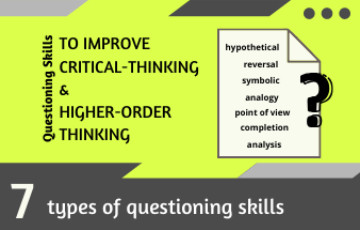
Hypothetical Questions:
Hypothetical questions kindle your brain to look for possibilities and fresh ideas. Hypothetical thinking enables an individual to anticipate, predict, and describe the pros and cons.
Examples:
- What will happen if I remove this?
- What will you do if this happens?
Hypotheses are good for exploring prospects. It also helps you in preparing a contingency approach.
Reversal Questions:
Reversal thinking makes an individual 'twist the problem in reverse or sideways' to understand it. It brings out alternate possibilities to deal with problems.
Examples:
- In what ways we are complicating this problem?
- Why should we not include it?
- What happens when we don’t resolve it?
Symbolic Questions:
This type is about using multiple formats to understand a solution.
Example:
We can use a chemical equation structure to explain what is happening inside a tree.
Analogy Questions:
It’s the most common type of questioning. We compare and correlate here.
Example:
- What is the physics behind birds flying?
- What is the connection between a chemical-reaction and cooking?
Point of View Questions:
Here, you put yourself in a different shoe and ask questions and answer them. This questioning skill is important in improving critical and higher-order thinking.
Example:
- How will my boss think?
- How will an experienced person handle this?
Completion Questions:
It is like “fill in the blanks”. The questions will end abruptly. We have to use our imagination to close it appropriately.
Example:
- What happens after this stage?
- How did it disappear?
Analysis Questions:
It is like a spider spinning a web. You ask a web of questions instead of raising basic questions. You go deeper levels and look for patterns and ideas.
Example:
- What are the effects? Where it is extending?
- What happens there if I do this here?


